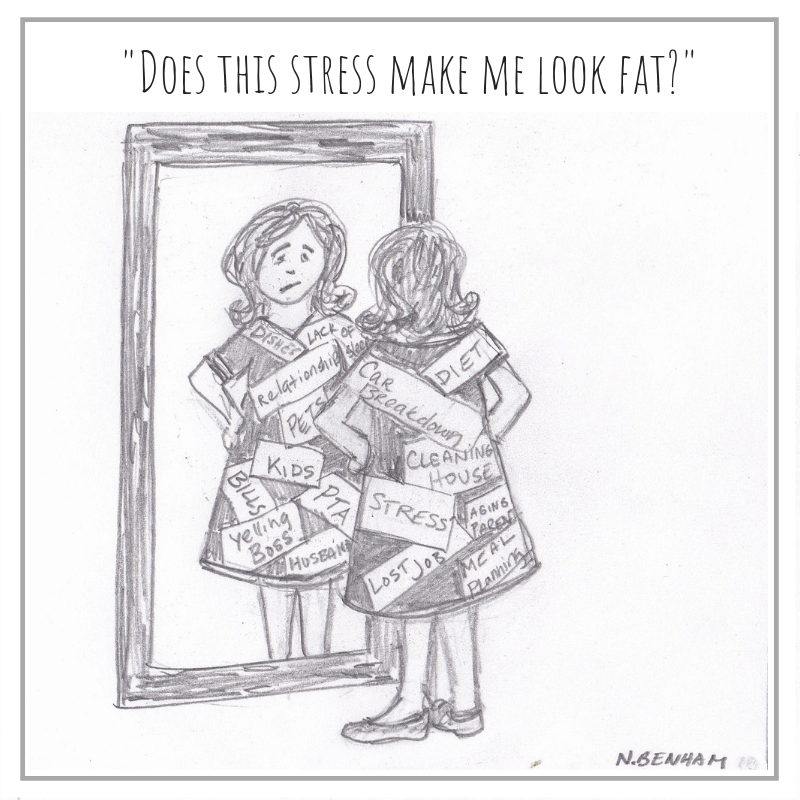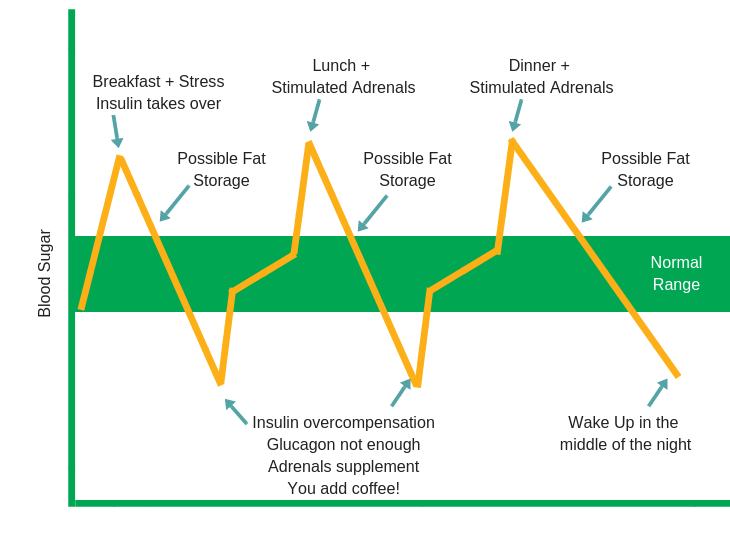
You may have experienced weight gain during particularly stressful times in your life, and you may have even heard that “stress contributes to weight gain”. If you do a quick internet search for related terms like “stress and weight gain”, the main answer you get is that stress releases hormones that increase hunger (specifically for fatty and sugary foods) and so you overeat and subsequently gain weight. Take this excerpt from this WebMD article for example:
The bottom line? “More stress = more cortisol = higher appetite for junk food = more belly fat,” says Shawn M. Talbott, PhD, a nutritional biochemist.
This may match with your experience as well. Haven’t you ever felt stressed and hit the vending machine for a candy bar or some form of carbohydrate? Or maybe you go for coffee. I know I have! I still do this type of thing. I mean, how can I be blamed…it’s biochemical, right?
There’s really no denying that this sort of pattern can be seen quite clearly when people are under stress, but there’s more to the story with stress, cortisol, and weight gain.
For some people, stress is chronic (i.e. it’s pretty much constant in their life). What happens then? Do we just eat junk food all the time because that’s what we crave? For most people under chronic stress (and that’s more of us than are willing to admit it), that’s not exactly how it works. They’ll go about their busy and stressful lives, tell themselves they just need more willpower, and skip the vending machine…at least for a while. Sometimes people will go days, weeks or months staying on plan with very little junk food even under constant stress, but they’ll still gain weight (or at least not lose any).
Maybe you’ve experienced a difficulty losing weight even when you don’t reach for the candy bar or overeat when under stress. How can this be?
Well, let’s take a bit of a tour of your stress response hormones and your blood sugar system and see how it’s possible to gain weight from stress without overeating.
Wait…did I just lose you with that nerdy transition? No! Stick with me here.
Stress Hormones
There are three main stress hormones. Adrenaline (also called epinephrine), noradrenaline (also called norepinephrine), and cortisol. The network of functions and effects produced by just these three hormones alone is mind-boggling. We certainly can’t go into all of the roles of these hormones in a blog like this (I don’t even think we truly know ALL of the roles and functions). We’re going to focus mostly on cortisol and you’ll see why in just a second.
Adrenaline (Epinephrine): This is also commonly referred to as the “fight or flight” hormone. It is produced by the adrenal glands when your brain lets them know that a stressful situation has presented itself. This hormone acts very quickly and produces almost instant changes in energy (blood sugar goes up to make more energy available for transport to the cells), heartbeat, breathing and more.
It’s helpful sometimes to think of how these hormones function in terms of more acute and specific stress events. For instance, if you see your child about to fall from a high place on the playground, you’ll get a hit of adrenaline. You’ll suddenly find energy to run faster than normal to try to catch your child.
Noradrenaline (norepinephrine): This hormone does essentially the same thing as adrenaline and is very similar in structure. There are some differences in receptors and things we won’t get into, but it is also involved in the fight or flight response and acts very quickly.
Cortisol: This hormone is also produced by the adrenal glands and is sometimes actually referred to as “the stress hormone”. This is the hormone we’ll be most concerned with in this article.
Cortisol is slower acting, taking minutes rather than seconds to feel the effects under stress, and it’s slower to clear.
Cortisol is the star of the show here and one of its main functions is to stimulate the liver to create more glucose through a process called gluconeogenesis (um…that means “make new glucose”). This is different than changing glycogen back into glucose (glycogenolysis). Gluconeogenesis involves turning proteins into glucose in the liver.
This will all come together in just a moment.
Non-Stress Blood Sugar Hormones
There are two main hormones that control your blood sugar levels in normal situation. Insulin and Glucagon. They are like opposites of each other.
Insulin: When your blood sugar gets high, your pancreas releases insulin. Insulin acts as an escort to take the glucose where it needs to go. First it transports it into your cells for energy production. Then, it will transport it to the muscles and the liver where it is stored as glycogen (a process called glycogenesis). Then, if there is still some left, it stores it as triglycerides or cholesterol (fat storage).
So, insulin helps bring blood sugar down when it’s high. It can be high from eating a meal or it can be high from things like cortisol stimulating too much glucose production due to stress!
Glucagon: This hormone is also secreted by the pancreas. It comes into play when your blood sugar gets low. It stimulates the muscles and the liver to turn the stored glycogen back into glucose (that’s the glycogenolysis I mentioned earlier).
The processes of insulin and glucagon are the normal methods of controlling blood sugar in a relatively (or hopefully) narrow range.
A Typical Day
In a relatively healthy person, with moderate to low levels of stress, insulin and glucagon manage blood sugar in a narrow range.
The person eats breakfast and blood sugar rises but not out of range. Insulin is released from the pancreas to escort the glucose into the cells for energy production. Any excess is stored as glycogen, and if the person didn’t overeat for their energy needs, none is stored as fat. As blood sugar continues to go down between meals, glucagon does its job of stimulating the muscles and liver to turn glycogen back to glucose for use as needed. The person continues this way with a steady flow of energy through the day with healthy meals. Ah…doesn’t that sound great?
Now, consider the person under chronic stress:

The graph is an oversimplified representation of the blood sugar changes for a person under chronic stress (like a constant slow cortisol drip throughout the day). Let’s go through a hypothetical day (assuming healthy meals):
We sleep in a little bit and now we’re late for work. So we eat breakfast on the way to work driving in morning rush hour traffic (stress). Now the normally moderate blood sugar increase is pushed even higher by gluconeogenesis and the stress response.
As with normal function, the pancreas secretes insulin to deal with the blood sugar increase. However, the energy expenditure doesn’t meet the blood sugar level because the physical response didn’t meet the expectation of the biochemical response. In other words, this type of stress (driving down the busy highway eating and worrying about being late) didn’t require large amounts of physical energy such as running from an attacker would. So, insulin often has nowhere to put the excess glucose and begins the process of fat storage.
Then, in many cases, the insulin release from the pancreas overcompensates and blood sugar drops well below range. This is the mid morning slump that you may feel where you reach for the coffee or sugar to pull yourself out of the energy dip. Interestingly (or unfortunately?), caffeine and sugar both stimulate the adrenals and the stress response. So, while it often seems to work to increase energy, at least part of the reason is cortisol and the resulting increased blood sugar! It’s like a cortisol swimming pool.
Now, it’s lunch time and we start the same process over. The coffee (or whatever caffeine used) or sugar has sent blood sugar back toward normal and now the meal adds on top of that. So, we get another spike above normal range (theoretically) and the pancreas responds as if we have an emergency and dumps insulin into the system once again. Now we’re in that post lunch conference where we have to present our data to the executives (stress>>>cortisol>>>gluconeogenesis). Again, we’re not running from a bear and we don’t need this much glucose. So, where do we put it? The midsection as fat.
Do I need to type the rest of this out? Afternoon coffee or vending machine visit comes from insulin overcompensation and low blood sugar and the cycle repeats. Ugh.
Oh, and don’t forget the 2am wakeup call when your adrenals fire more cortisol or adrenaline because your blood sugar drops too low again.
Hey, Can I Make This Worse?
Now, I know this already looks like a pretty bleak picture…but I feel like I have to say this: Imagine what happens when we add sugar and refined carbs in our regular meals into this picture.
Those spikes are higher. Those dips are lower. Those coffees are stronger. And, if we’re honest, those wine bottles are emptier at the end of the day.
The Real Bottom Line
The “bottom line” I quoted from WebMD above is essentially that stress raises cortisol and that increases cravings for sugary and fatty foods and that causes overeating and that leads to increased weight.
But, as I said, there’s more to the story.
The real bottom line, in my opinion, is that stress raises cortisol, which raises blood sugar when we don’t physically need more blood sugar, which leads directly to fat storage. When you add cravings for sugar and poor general eating habits into the equation, when they’re acted upon, the problem is made even worse. But, they don’t even need to be acted upon for fat storage to be a problem with chronic stress.
The Keto Conundrum
I wrote just last week about why I’m not keto or vegan and explained specifically about ketosis. I’ll let you read that (see the link in the last sentence) if you like. But, what keeps coming to mind as I ponder blood sugar control and stress is that the keto diet seems to serve as a strikingly good “band-aid” solution to this problem.
If you don’t know what the keto diet is, it’s basically limiting your carbohydrate intake to about 50g or less per day. The point is to force your body into a state called ketosis whereby it doesn’t rely on glucose for energy (primarily) but instead produces ketone bodies that are used as fuel especially in the brain.
In light of what we’ve talked about in this article, it makes perfect sense why the keto diet has become so popular and has seen so much success with so many people. It essentially dampens or eliminates the meal-related spikes in blood sugar because you aren’t eating any measurable amount of carbohydrate. So, even if you’re adrenals are pumping out cortisol and creating some glucose, it’s not adding to a bunch of glucose you’re getting through meals.
Now, that’s just a theory, but it makes sense to me. It’s also not an endorsement for the keto diet. As I said, it would be a band-aid solution at best. It could be a short term solution to help someone overcome a lack of blood sugar control and move to a more normal state, but I still don’t see it as a long term solution.
A Few Other Things
One of the other major things that makes the prevalence of this sort of chronic stress disturbing is some of the other things that happen in a stress response state. There are multiple things that happen, but the two I’ll mention are these:
- Stress diverts blood flow and priority away from the digestive system
- Stress diverts priority away from the immune system
So, with chronic stress, you won’t be digesting your food as well (which means you won’t be absorbing vital nutrients), and you will be more susceptible to disease.
What Do We Do?
Well…
Haha! I guess I’m all about the Will Ferrell gifs today.
OK, so I know that “just relax” isn’t really very useful advice. You may not be able to just quit your job or eliminate stressors in your life. I get that! I do.
I guess the first thing I want to tell you is that this is normal and there’s not something “wrong” with you. It really is biochemical. I won’t do the gif again.
The second thing I’ll say is that a nutrient-dense, whole food diet will go a long way in helping to mitigate this issue. That is a moderate carbohydrate diet (not necessarily keto, I recommend more like 25-35% carb for most people) with quality carbohydrate sources, good fats, and adequate protein.
The last thing I’ll say is that, if you can’t eliminate stressors in your life, the next best thing is trying to eliminate stress around meals so that you can digest them. I was actually having this discussion in person with a friend and when I suggested that idea, I totally lost him. That literally sounded impossible to him. So, I don’t know if that’s something you can do or not, but the bottom line is that reducing stress – especially around meals – is going to be key to keeping your blood sugar in balance.
Maybe…just maybe, my friends…the French Paradox is really no paradox at all.



Comments (2)
Makes sense
Good information. Thank you!